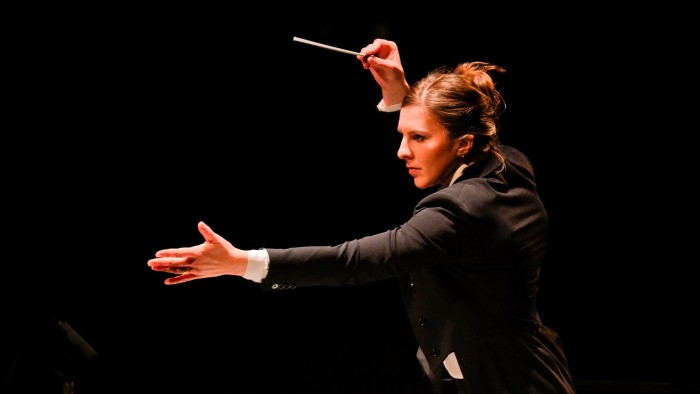Summarize this content to 2000 words in 6 paragraphs in Arabic “About six or seven years ago there was a kind of flip within the national rhetoric. Suddenly, xenophobia became more prominent — and in a new way,” says Lidiya Yankovskaya. “Rather than speaking about the economic challenges of large numbers of immigrants coming into the country, it became direct, anti-immigrant sentiment. That was especially striking to me in a country like the US, a country of immigrants where everybody is descended from somebody who comes from somewhere else.”One of those who has come from somewhere else is Yankovskaya herself. She was born to a Russian-Jewish family in Saint Petersburg; her parents were keen amateur musicians who encouraged Yankovskaya to take up the piano and violin. The family moved to the US when she was nine. She studied conducting at Boston University and, since then, has risen through the ranks, not least by drawing on the wide cultural sympathies she has gained through her own experiences.In seven seasons as music director at the Chicago Opera Theater, Yankovskaya spearheaded the commissioning of 11 new operas, including works from six female composers and seven creators of colour. As founder of the Refugee Orchestra Project, she has championed the interests of refugee musicians. Her musical tastes know no boundaries and her next concert in the UK is an all-Indian programme with the London Philharmonic Orchestra.All this, she says, goes back to her early experiences in Russia. “The collapse [in the 1990s] was such a difficult time, especially in the big cities, where there was a great contrast between incredible wealth and people not being able to afford basic necessities. There was an assumption among leaders in the west that, if you place people in a free economy, they naturally know how to operate within it, but it doesn’t work that way. The only ones who did were unsavoury characters who had operated in the black market and terrible things happened, the repercussions of which we are still seeing today.I vividly remember seeing demonstrations where Nazis marched with signs saying ‘Kill all the Jews’“My parents were engineers, so they were in the middle class, many of whom lost their jobs. There was a long period when my mum, who worked for water treatment plants, did not get paid. I was lucky that the educational system continued to thrive and that allowed me to begin my musical training, but there was a great deal of antisemitism because people’s nature is to blame the largest minority. As a child, I vividly remember seeing demonstrations where Nazis marched with signs saying ‘Kill all the Jews’ and other racial slurs. It was a frightening time for people of all minority backgrounds, but especially the Jewish population, because that was so large in Saint Petersburg.”Emigrating to the US was not easy. Although Yankovskaya’s family had a relative already living in upstate New York, applicants faced daunting challenges, including a wait of three years or more and a demand that specific cases of antisemitism be documented.It is easy to see where Yankovskaya found the impetus to set up the Refugee Orchestra Project. Although she had spent much of her life in the US and had started to blend into the general culture, she felt she had to act when she saw the rise in hatred against immigrants. “I’m not a politician, so I thought, ‘What, as a musician, can I do about it?’ Music has a powerful way of conveying certain messages and bringing people together. Just like Daniel Barenboim with his West-Eastern Divan Orchestra [a blend of Israeli and Arab musicians], the Refugee Orchestra Project brings together musicians from across the world who have a shared experience. I believe the fact that our musicians come from such different backgrounds makes for richer music-making.”The Refugee Orchestra Project is a non-profit organisation funded partly by donations, partly through working in partnerships on specific projects. It was created in 2016, in the wake of the Syrian refugee crisis, and has since spread internationally, focusing on refugee composers. Next up will be a chamber-music evening in Cambridge, Massachusetts, celebrating Afghan culture.Among past events, the most prestigious was the 2018 UN Day Concert at the United Nations headquarters in New York. “Traditions of Peace and non-Violence” presented Indian music with sarod player Ustad Amjad Ali Khan, accompanied by his sons Amaan Ali Bangash and Ayaan Ali Bangash.These are connections that Yankovskaya has kept going. Her forthcoming concert with the London Philharmonic Orchestra combines three faces of Indian music, Ustad Amjad Ali Khan playing his sarod concerto Samaagam, a new work by Indian-American composer Reena Esmail and extracts from film soundtracks by Slumdog Millionaire composer AR Rahman.“What is remarkable about this concerto is that it is neither Indian classical music nor standard western orchestral music,” says Yankovskaya. “It is something else and I think that is the way to move our art form forward, enriching what we do through collaboration.”The music of different cultures has always been part of her life. Although Yankovskaya says she was not fully exposed to Jewish music until she arrived in the US, Russian folk music was pervasive in her early years and she quickly came to understand how its roots were embedded in classical composers such as Stravinsky. “To this day I have a memory of seeing a puppet version of Petrushka when I was very small and the music always felt to me like folk music, because that’s really what it is. You get the same feeling if someone analyses traditional classic jazz, which looks dissonant on the page, but it is a kind of music that is ingrained in you.”Drawing these strands together leads to Yankovskaya’s commitment to new music. Although she has now stepped down as music director of Chicago Opera Theater, she continues to oversee the company’s Vanguard Initiative, which has premiered successful operas such as Quamino’s Map by Errollyn Wallen and The Life and Death(s) of Alan Turing by Justine F Chen.“We need to create an environment where we can initiate art that speaks for today. At some point in the last century we forgot this in the classical music world and a museum mentality started to set in. Great composers of the past, like Mozart and Verdi, had many opportunities to experiment and fail, which today’s composers rarely have. The programme I run at Chicago Opera Theater offers a two-year residency to enable them to be prepared as far as possible for that big commission when it comes, and we should do that in the symphony world too. Supporting living creators: this has been one of my passions from the very start of my career.”Lidiya Yankovskaya conducts ‘An evening with Amjad Ali Khan’ with the London Philharmonic Orchestra at the Royal Festival Hall, London, on January 25, southbankcentre.co.uk
rewrite this title in Arabic Conductor Lidiya Yankovskaya: ‘People’s nature is to blame the largest minority’
مقالات ذات صلة
مال واعمال
مواضيع رائجة
النشرة البريدية
اشترك للحصول على اخر الأخبار لحظة بلحظة الى بريدك الإلكتروني.
© 2025 جلوب تايم لاين. جميع الحقوق محفوظة.




